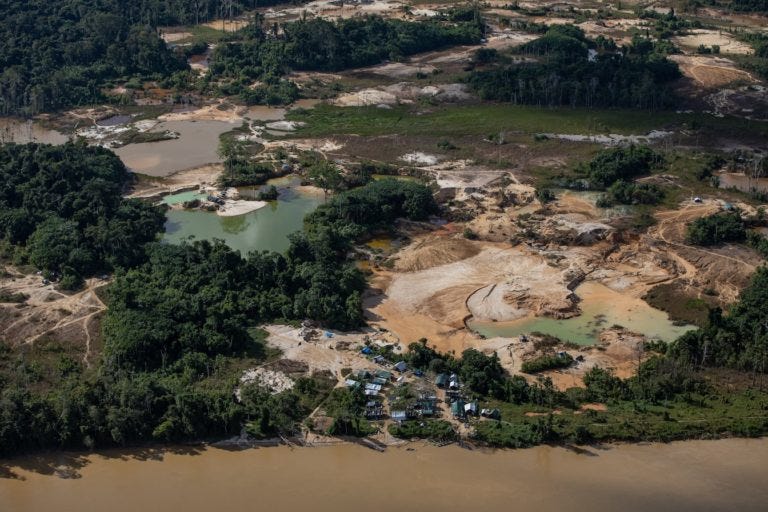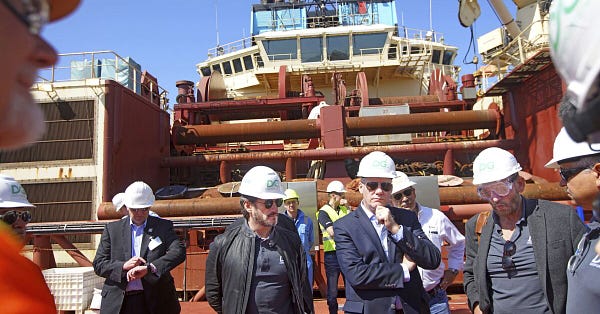Brazil was left with a "climate bomb" in mining
Brazil is known for its iron and gold, and the new president must confront the legacy of years of deregulation and a mining boom that has put lives at risk, according to a new report.
Climate technologies require enormous amounts of metal. I’m Ian Morse, and this is Green Rocks, a newsletter that doesn’t want dirty mining to ruin clean energy.
More news after this:

Just after the first round of voting in Brazil’s presidential election, and just a few weeks before the second round, a mining association handed president Jair Bolsonaro a list of policies it wanted. The industry group promotes company interests in the state of Minas Gerais, named (‘general mines’) for its mineral contribution to the country. In 2015 and 2019, it was the site of two of Brazil’s worst environmental disasters when two separate tailings dams broke and mine waste surged downstream.
The election sparked Bolsonaro’s meeting with the association in October last year. The conservative populist leader had boasted an easy victory in the election, but his left-wing rival, Luiz Inacio Lula da Silva, had become the first candidate to beat an incumbent. If Bolsonaro was worried about the runoff election, the mining sector was doubly so.
It appealed to Bolsonaro’s brand of nationalism. Brazil’s constitution says mining is a national interest. As a result, the group argued, communities should not have a say in whether mines appear in their neighborhood. Free, prior and informed consent is, then, unconstitutional.
Bolsonaro’s government had already passed legislation that allows companies to approve their own tailings dams. His government had spent the previous four years dismantling regulations that restrained mining companies and writing new ones that opened up Indigenous territories and new financing. He had also openly promoted illegal mining in Indigenous territory, claiming to have done some of his own back in the day. Illegal mining, freed of the threat of law enforcement, spread through remote areas where ecosystems thrived and Indigenous groups lived. It boomed, as officials intended.
Bolsonaro lost, and Lula became president on January 1. Before the month was out, Lula had implemented a strict ban on mining in Indigenous territories. Authorities burned a plane and seized machinery and weapons in attempts to interrupt the mining that had evolved from small-scale illegal operations to robust, well-armed networks. (Interestingly, police found internet devices for Starlink made by SpaceX.)
But it was too late for many. Four years of unrestrained mining throughout the Amazon had left forest slashed and water polluted. People depended on these ecosystems for life. The Yanomami, an Indigenous group in the Amazon with an estimated 28,000 members, were hit with widespread malnutrition and disease. Officials declared a medical emergency and accused Bolsonaro of committing genocide.

As detailed in a new report, Bolsonaro’s legacy on Brazil’s mining sector has left the new administration with a “climate and anti-Indigenous bomb.” Lula’s work now, says report author Maurício Angelo, is to defuse this bomb. Angelo runs the Mining Observatory, an investigative journalism outfit.
“Understanding what is happening in Brazil is essential for the world and for containing, at best, the climate crisis, since the destruction of the Amazon and Cerrado plays a central role in complying with the Paris Agreement and other mitigation measures,” Angelo told me.
Brazilian mining and the energy transition aren’t often paired, but the country produces a lot of the critical ingredients to building new renewable infrastructure. Iron ore, gold and copper are particularly important to its economy. Iron ore alone comprises roughly 70% of the value of the country’s mineral production. That takes a lot of ore to accomplish when it is almost literally dirt cheap. The country is also a top producer of bauxite (for aluminum), tin and manganese. It produces the overwhelming majority of the world’s niobium, an element used to resist corrosion and improve strength in stainless steel.
“Some of the largest mining companies in the world operate in Brazil, such as Vale, BHP, Kinross, AngloGold Ashanti, Anglo American, Hydro, Mosaic, Alcoa and others,” says Angelo. “Minerals exported from Brazil supply the Chinese and Asian, European and US markets in particular. Mining plays a central role in the climate crisis, CO2 emissions, global geopolitics involving critical minerals, and it is literally hot right now.”
Brazil has also promoted lithium, uranium, and vanadium projects. A Canadian company is set to sell Brazilian lithium to the market this year, and a US company recently bought 58 square miles of coastline for its rare earths, titanium, and uranium deposits. The US government’s development bank has also tossed $25 million toward a nickel-cobalt project.
Angelo’s report, published with Smoke Signal, describes dozens of decrees and laws — or sticks of dynamite in the “bomb” — that may leave lasting impacts on the mining industry as well as the environment and people the sector impacts. Agencies under Lula’s government have reached similar conclusions. “In the mining sector, measures have been enacted, through ordinances and decrees, to deregulate the sector and encourage predatory activities,” reads an analysis from the working group responsible for transitioning mining policy in the new administration.
From the report:
In mining, nothing happens by chance or overnight. The current scenario, whether for illegal “garimpo” in indigenous lands or for large transnational mining, has been structured little by little, excavator by excavator, tractor by tractor, through infralegal changes here, legislative bills there, and at suspicious secret or open meetings. Dynamite stick by dynamite stick, a true Brazilian climate bomb has been set.
In the last month before Bolsonaro’s team left office, it approved draft text for a new mining code that would update the 1967 one, and it now awaits votes from legislators. It had sat without approval for a year. The committee that wrote it was composed almost entirely of members of Bolsonaro’s base, including mining lobbyists. Civil society groups are concerned the mining code will strip powers from government to regulate companies, leaving communities to fend for themselves against multinational corporations.
Meanwhile, 700,000 people lodged claims over the environmental damage of the tailings dam disaster at Mariana in 2015, threatening mining giant BHP with potentially a $44 billion lawsuit.
More News
After $2 million of nickel turned out to be bags of rocks, ore warehouse staff around the world are rushing to double check their own stocks.
Diplomats are calling out the head of the deep-sea mining regulator ISA for breaching neutrality and promoting mining.
A big-pocketed backer of deep-sea mining has pulled out of the maelstrom.
Albemarle is planning a $1.3 billion lithium plant in South Carolina.
New research suggests countries are using weak measures to identify mercury pollution, possibility underestimating the extent of threats to ecosystems and people.
An industry-funded study found that deep-sea mining would have lower carbon impacts than terrestrial mining. A study funded by an NGO found it could disturb the greenhouse gases trapped in the deep sea, in addition to decimating species yet unknown to science.
Rio Tinto has much more to do to protect cultural heritage sites, according to an audit it funded after it destroyed important sites in 2020.
Rio is said to be the first mining conglomerate to publish site-specific water data.
A colossal iron ore operation has restarted construction in Guinea, after work the post-coup transitional government pressured companies to agree to stricter terms.
The Colombian government destroyed gold mining equipment it said was harming people and the environment, and miners protested by barricading traffic.
A US-Japan deal for EV battery materials grants Japanese companies greater access to tax credits from the IRA.
The Business and Human Rights Resource Centre identified allegations of human rights abuses and illegal pollution among companies in the renewable energy supply chain in the Andes.
Protesters at a Chinese lithium mine in Namibia say operations are illegal and demand compensation.
A report from Swiss NGOs found that most due diligence systems among the large extractive companies they reviewed were weak and likely had no effect on supply chain problems.
In Pakistan already this year, 30 miners were killed and 20 more injured.


Reads
≠endorsement
Scratched EV battery? Your insurer may have to junk the whole car (Reuters)
Indonesian farmers fight for their land in nickel mining boom (AFP)
The EV mining rush could come to Montana’s mountains (High Country News)
The Big Battery Boom (SOMO)
Your stove is the first appliance to get a battery, but not the last (Washington Post)
Where are Clean Energy Technologies Manufactured? (Visual Capitalist)
Electric Vehicle Battery Makers Test a Future Without Lithium (Bloomberg)






Great reporting! Thanks!
How possible is it that Lula will/can enact mitigations to this bomb?